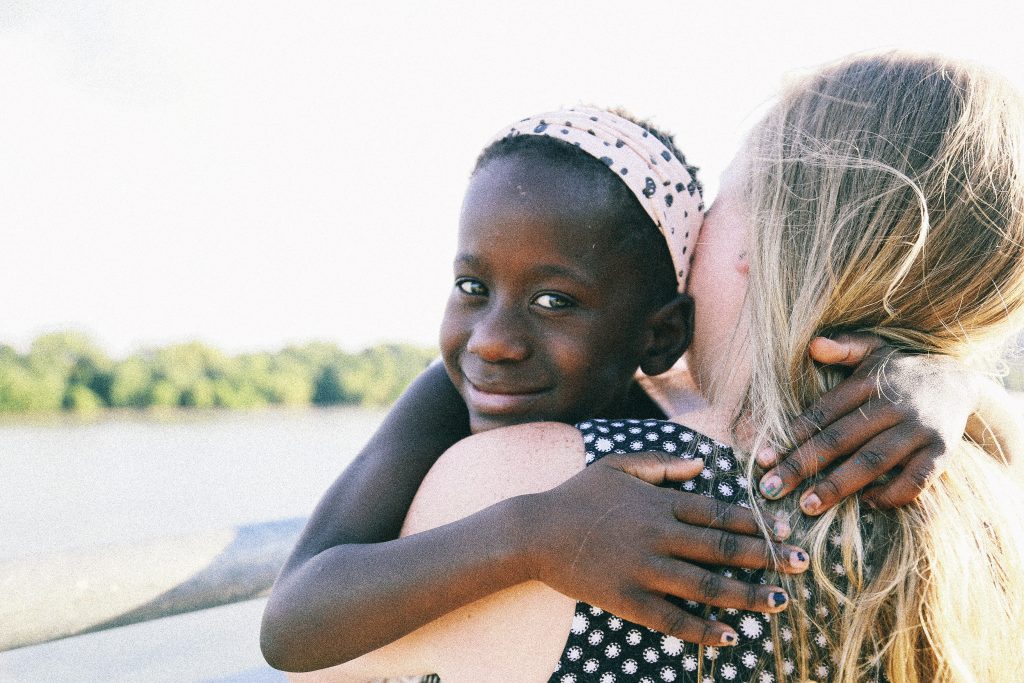20+ Travel Tips for International Adoption

International travel of any kind can be difficult, especially when you’re traveling to a new country to meet your child for the first time. In an effort to help make your trip a little easier, we’ve compiled a list of 20+ travel tips for international adoption from parents who’ve walked this road before you.
While You’re Gone:
Stay in Touch
Utilize apps like FaceTime, WhatsApp, Zoom, and Google Meet to stay in touch with your family at home. Most are easy to use and can be a great alternative to the expense and hassle of changing your mobile phone plan while you are away.
Stay Connected
If you have other kids at home, having Mom and Dad traveling for a longer than usual amount of time can be hard. One idea to help the time pass more quickly is for your children to create a calendar or count down marking your time away. For example, you could create small gift bags or letters that your children open each day you’re away, or have a big calendar where they can mark the days until Mom, Dad, and their new sibling are home.
Packing Tips:
Gifts
You may want to consider bringing small thank-you gifts for your child’s caregivers or your in-country guides and/or translators. Many times, your adoption agency will have suggestions for what is appropriate.
Files
Keeping your paperwork organized in files during your trip will be a lifesaver as you work through the legal process and court system in your child’s country. Remember to bring copies of important documents as well as any originals that are required during the process. Your agency should provide you with a list of required documents for your trip.
Notebook
Keep a small notebook to write down questions, important notes, or other tidbits you may want to remember during your travels. Or create a note on your mobile phone. This helps not only during the legal process in-country but also to remember personal experiences you may want to journal about later.
Journal
As chaotic and busy as those first days may be, you will want to remember as much as you can about your trip. From the first time meeting your child to all the other incredible experiences you have, a journal from the time in your child’s home country will become a treasured keepsake.
Crib Sheets and Blankets
If you’re bringing home a younger child, you may find it helpful to have your own sheets and blankets for them. Not only will the sheets and blankets carry your smell (which is helpful for attachment), but the hotels you stay in may not have them available.
Medicine
Between jetlag and the needs of a new baby or toddler, sleep can be hard to come by! Melatonin is a great natural option to help you catch some sleep when you can. Your agency and/or pediatrician may also have a list of medicines that may be helpful in case you or your child become ill while traveling. These may include Advil, Benadryl, anti-nausea meds, or other simple remedies which can be hard to find in your child’s home country.
Diapers
When traveling abroad, you may find diapers to be more expensive than at home. You may want to bring your own, particularly if you are partial to a certain brand.
Disposable Gloves
Depending on your child’s country of origin or the conditions in the orphanage where your child received care, it is possible that he or she may have picked up a parasite of some kind. If so, having disposable gloves handy will definitely help during diaper changes.
Laundry Detergent
Again, depending on the country, laundry services may not be easily accessible. It is always a good idea to bring along some travel-size laundry detergent just in case.
Hand Sanitizer
This has countless uses! Keep it with you all the time.
Water Purifier
In some countries, it is recommended to use bottled water rather than drink water from the tap. If water bottles are hard to come by, you’ll be thankful you brought your own water purifier.
Packs of Travel Tissue
Toilet paper may not be as commonly provided in the country you are visiting as it is in other countries. In which case, you’ll be glad to have some of your own.
Fluoride-Free Toothpaste
Using toothpaste may be a new experience for your child, so assume they will swallow it as you begin brushing their teeth.
Small Flashlight
This can be helpful for a variety of things. You may also want to bring extra batteries.
Feminine Products
Depending on the country you’re traveling to, it may be hard to find familiar hygiene products. Take along supplies in case they are needed while you are away.
The Flight Home:
Request Extra Space
If you have a long flight home with a young child who has little to no experience on an airplane, the hours spent in the air can feel daunting. Check with your carrier to see if it is possible to request a seat near the front of your cabin. These forward seats often provide a bit more floor space allowing your child more room to play or curl up with a blanket and a book.
Bring In-Flight Activities
Depending on the age of your child, pack a variety of in-flight activities such as books, toys, stuffed animals, and tablets.
The First Weeks Home:
Paper Products
Stock up on paper products (paper plates, plastic utensils, napkins, toilet paper, etc.) before you leave. In those first crucial days and weeks at home, attachment, bonding, and sleep will become a bigger priority than washing dishes.
Meals
When family and friends ask how they can help, meals are a great answer! Assume the transition will be harder for everyone than you’re imagining now, and for a while, meal-planning will be the last thing on your mind. If you have a willing friend or family member, ask them to set up a meal calendar, so you don’t have to worry about organizing it.
Help Your Family/Friends Understand What to Expect
Before you come home with your child, communicate with your friends and family about what to expect in the attachment process and how they can support you. Otherwise, their well-intentioned help may not be so helpful at times. Consider sending a letter explaining some basic do’s and don’t’s of attachment.
At-home Fun
Before you travel, load up on fun at-home activities for your kids to enjoy once you’re back home with your new little one. For attachment and transition purposes, you may not want to venture out of the house much at first, so you’ll be thankful your other kids have fun things to do to keep them entertained! Some ideas include sidewalk chalk, watercolor paints, a slip-n-slide, window markers, face paint, board games, shaving cream art, bath finger paints, holiday crafts, etc.
Create One-on-One Time With Your Other Children
The transition of bringing a new child into your family can be difficult for everyone. In those early days and weeks, it is important to keep connection with your other children by carving out some one-on-one time with them. This will not only allow you to have some focused time of fun but also the opportunity to check in and see how their hearts are doing in the transition.
Stock the Pantry
Once you get home, meals may be the last thing on your mind for a while. Whether pizza delivery becomes your “go-to” or you have friends and family who will be bringing you meals, you’ll feel better about your kids’ diet being a little less regulated if they’ve munched on healthier snacks throughout the day. Stock up on healthy snacks for your pantry before leaving, or ask a close friend or family member to make a grocery run for fresh snacks for your refrigerator just before you’re scheduled to arrive home.
Care for Your Child’s Story
In the excitement and emotions of bringing your new child home, it can be easy to find yourself answering all the questions you are bombarded with by curious friends and family. But when you take a step back, you may realize you want the details of your child’s birth story to be his or hers to share—if and when they choose to. It’s OK to give vague responses to even well-intentioned questions. Put yourself in your child’s shoes, and do what you believe is best for them.
Care for Yourself
We all have different hobbies, places, or habits that bring us rest. It may be taking a walk, reading, taking a drive in the car, going for a run, or enjoying a hot bubble bath. Find the thing that can best help you rest and recharge and take advantage of the opportunities to do so when you can. It may be hard to do, but you, your spouse, and your kids will all benefit from it!
*This list was adapted from its original post on www.BabeOfMyHeart.com
For more adoption tips and resources, visit





